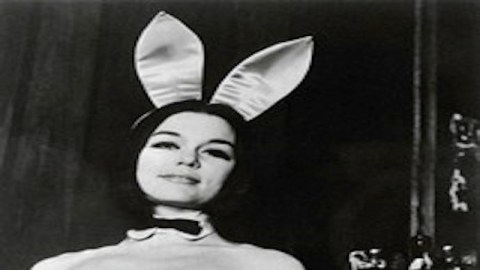Lesson 21: Gloria Steinem’s Aphorisms; Fish, Power, Love, Bunnies, and Life

It turns out that the phrase “a woman needs a man like a fish needs a bicycle” did not originate with Gloria Steinem, but rather was inspired by another phrase: a man needs God like a fish needs a bicycle. U2 used the line well once, catching the additional irony of the idea when sung by a man. Yet the phrase remains connected to Steinem because it remains emblematic of feminism’s crux: politics, mixed with wit, stirred through emotion. In the end, one central story of feminism was the story of relationships; boiling the movement’s politics down to “woman,” “man,” and “need” was critically brilliant.
Here’s what Steinem said about the quote:
“In your note on my new and happy marital partnership with David Bale, you credit me with the witticism ‘A woman needs a man like a fish needs a bicycle.’ In fact, Irina Dunn, a distinguished Australian educator, journalist and politician, coined the phrase back in 1970 when she was a student at the University of Sydney. She paraphrased the philosopher who said, ‘Man needs God like fish needs a bicycle.’ Dunn deserves credit for creating such a popular and durable spoof of the old idea that women need men more than vice versa.”
Intimacy Aphorisms
Aphorisms don’t have to be brilliant; they rarely stick. But perhaps exchanging “man” for God” and “woman” for “man” makes this one newly crucial for young girls. It doesn’t mean that girls don’t need love, nor does it mean that men are antithetical to their happiness. The key word in the phrase is not “woman” or “man” but “need.” Our finest feminists understood that dependence, not love, equals oppression. The first step to asserting independence occurs at the nuclear level, when girl meets boy.
“What we are talking about is a revolution, and not a reform,” Steinem says in a clip from the new HBO documentary, “Gloria: In Her Own Words.” What’s so wholly inspiring is the fact that definitions were less important than actions at the start of the movement.
Love Is Not About Power
At one point in the film, we see a close-up of Steinem’s daybook, into which she’s penciled the word “bunny-work.” Her time undercover at Playboy remains infamous, but know we see it differently: of all the bunnies, she remains the most cool. Her mind comes through the tail and ears and glamour and irony. Her honest, complicated feelings about the choice to do that piece are riveting, as are her riffs on marriage (“people ask me why I’m not married; I can’t mate in captivity”); on her hair (inspired by Hepburn’s Holly Golightly); on President Nixon’s sexual insecurities. But Steinem’s most illuminating lines are the simplest, like “love is not about power.” One woman’s consistent, clear vision for women in the rest of the world is as much a philosophy of love as it is one of work, and politics.





